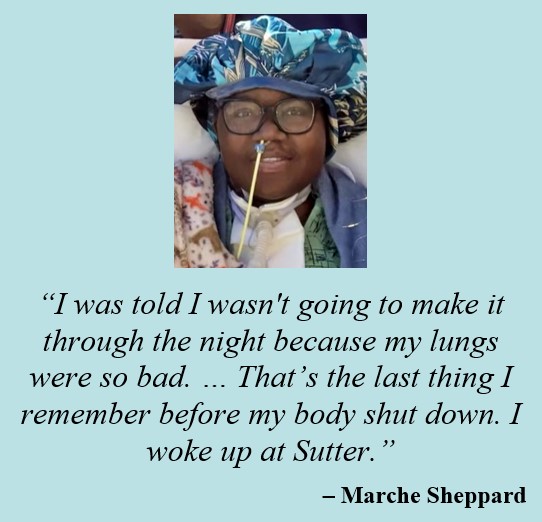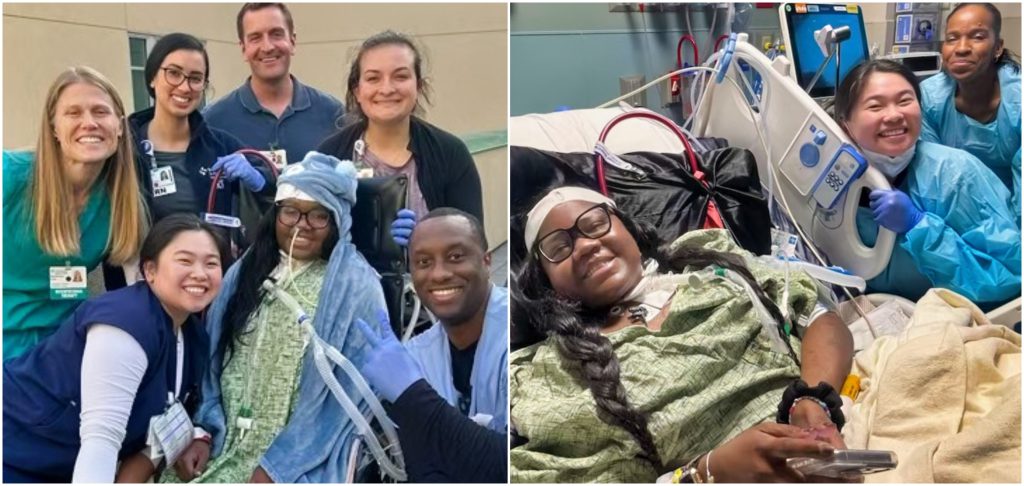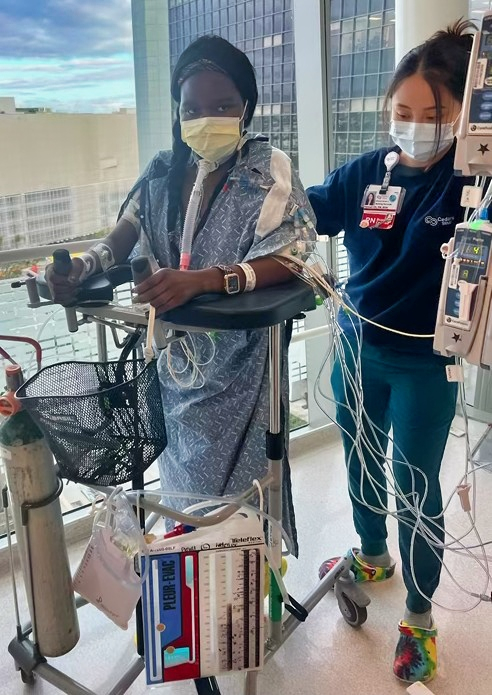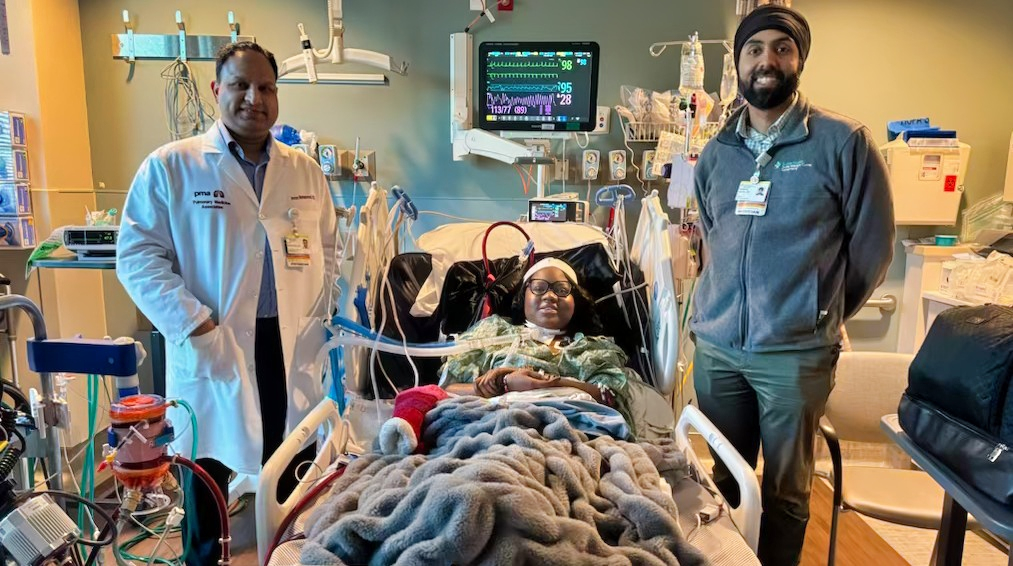Marche Sheppard spent four months on ECMO, which saved her life and got her strong enough to receive a double-lung transplant. Sutter Roseville pulmonary specialists Drs. Imran Mohammad, left, and Rajkamal Hansra were instrumental in her care.
By Debbie Ritenour, Vitals contributor
As a travel-certified nursing assistant, Marche Sheppard was used to embarking on new adventures. But when the Chico native woke up with a lump on her throat in early 2023, she had no idea that she was about to go on a completely different type of journey.
The lump quickly shrunk, so at first Sheppard figured it wasn’t a big deal. Then it got bigger again. When she returned home from an assignment a few months later, her aunt refused to let her go back to work until she got it checked out.
“I was referred to an ear, nose and throat specialist. He took samples of it, and that’s how I found out it was cancerous,” says the 27-year-old, who was diagnosed with Hodgkin’s lymphoma in May 2023. “It was stage 1, so I was lucky that it wasn’t further along.”
 Sheppard’s luck didn’t last long. She began chemotherapy, but about halfway through her treatment, she got what seemed to be a bad cold. One of the chemotherapy drugs had damaged her lungs, and the cold turned into an infection. By the time she arrived at the emergency room at Enloe Medical Center in Chico, Sheppard had developed acute respiratory distress syndrome.
Sheppard’s luck didn’t last long. She began chemotherapy, but about halfway through her treatment, she got what seemed to be a bad cold. One of the chemotherapy drugs had damaged her lungs, and the cold turned into an infection. By the time she arrived at the emergency room at Enloe Medical Center in Chico, Sheppard had developed acute respiratory distress syndrome.
“I was told I wasn’t going to make it through the night because my lungs were so bad. They had never seen scar tissue like mine before,” Sheppard says. “My doctor told me that my only option was to be placed into a medically induced coma. I asked him if I could do more research because I was kind of scared, and that’s the last thing I remember before my body shut down. I woke up at Sutter.”
From Single Lump to Double-Lung Transplant
Specifically, Sheppard woke up at Sutter Roseville Medical Center, where she had been airlifted and placed on ECMO support, or extracorporeal membrane oxygenation. It was mid-November by that point; Sheppard had been on ECMO for over a month.
ECMO is a life-saving treatment for patients with severe heart and/or lung failure. Venovenous ECMO, the type Sheppard was on, gives the lungs time to heal by essentially performing their work for them. The machine pumps blood out of the body, adds oxygen to and removes carbon dioxide from it, and returns it to the body. Sutter Roseville performed its first ECMO procedure just six months before Sheppard came to Sutter Roseville.
“Many people wouldn’t recommend ECMO in patients who have cancer, but because she had undergone chemotherapy and we were told she was likely in remission, we thought she was a good candidate,” says Dr. Vanessa Walker, chief medical executive at Sutter Roseville and a pulmonologist. “We took a chance on her.”

Marche Sheppard expressed her gratefulness to all the teams at Sutter Roseville Medical Center who cared for her during her four-month stay on ECMO. “They were literally the best care staff ever,” she says.
Sheppard was on ECMO for 120 days. During her treatment, she experienced several complications. She had to get a tracheostomy to ventilate her lungs. She had to have a gastrostomy tube inserted for feeding. She developed renal failure and had to undergo dialysis. She had heart failure and was given special inhaled medications to treat it.
“You name it, this woman went through it,” Dr. Walker says. “Throughout it all, our top-notch care team kept her strong. Our aggressive physical therapy team walked her through the hallways even while she was on the ECMO machine. We kept her going long enough to confirm through various biopsies that she did not have any residual cancer and eventually got Cedars-Sinai down in Southern California to accept her for a lung transplant evaluation.”
Cedars-Sinai did more than evaluate Sheppard; the renowned facility agreed to give her a double-lung transplant. Sheppard was flown to Los Angeles and received the transplant on Feb. 26. By March 7, she was up and walking on her own, and on March 14, she was sent home.
Not Just Surviving but Thriving
Today, Sheppard and her new lungs are doing well. She goes in for monthly checkups and gets at least 30 minutes of exercise a day. While she occasionally gets winded if she overexerts herself, for the most part, she says, she feels normal.

Marche Sheppard walks the halls of Cedars-Sinai Medical Center after receiving a double-lung transplant.
“I feel strong now. I’m able to do everything on my own,” she says. “I look back on it, and it’s just crazy to think about everything that I went through.”
Sheppard is grateful for everyone who took care of her during her months-long ordeal, from the Sutter Transfer Center staff, who were engaged in both the inbound transfer to Sutter Roseville and the subsequent transfer to Cedars-Sinai, to the housekeeping staff, who chatted with her as they kept her room spotless. She is especially grateful to the nurses and other staff who strived to keep her spirits high even when she wasn’t awake to appreciate it.
“They were literally the best care staff ever,” she says. “They decorated my room for my birthday in November. My aunt told them I loved Christmas, so they gave me an anonymous gift every day starting Dec. 1. I truly forgot I was in the hospital because of their treatment. They always went above and beyond for me, and I am forever indebted.”





